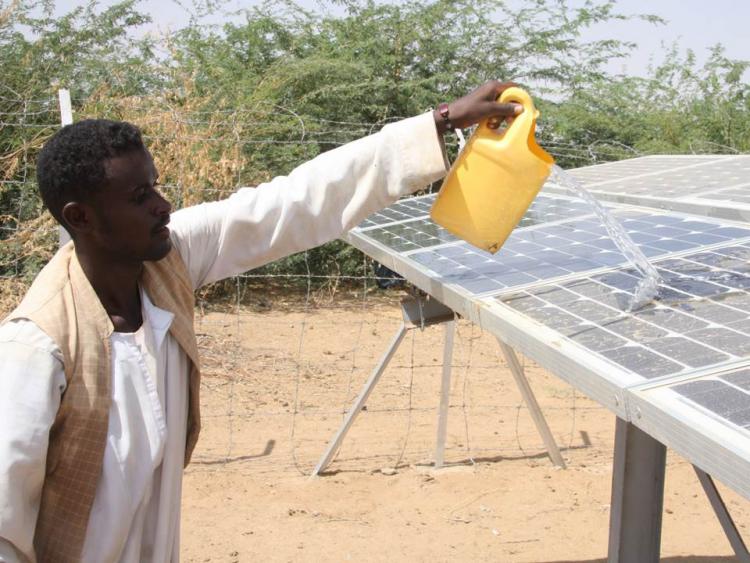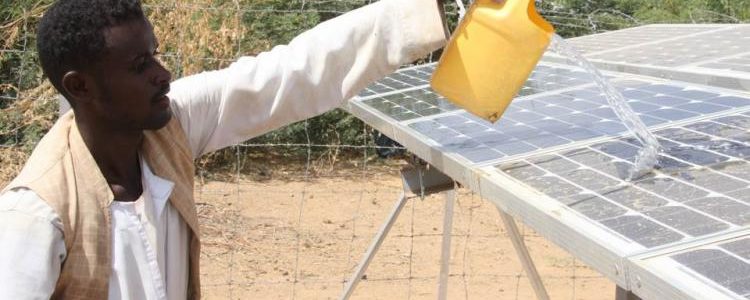
The scale of the climate challenges we face today and in the future is clear. The adverse effects of climate change are already being felt around the world and particularly in Sudan. Sudan is indeed among the most vulnerable countries in the world to climate change. Increased frequency of droughts and high rainfall variability over the past few years have already put stress on the rainfed agriculture and pastoralist systems, which are the main livelihoods in the rural areas of Sudan. Moreover, reduction of rainfall, in combination with increased water demand and land use change, has contributed to desertification of millions of hectares and depletion of water sources, especially in North Darfur. Thus, climate change will undermine both the development gains made over many decades and the prospects for achieving the 2030 agenda for sustainable development.
The Paris Agreement on climate change – the landmark global agreement adopted by almost 200 countries in 2015 – sets out an action plan to put the world on track to avoid such dangerous evolutions. It has set the direction for the global transition to low-emission, climate-resilient economies and societies.
However, we already know that the emissions reduction targets put forward in Paris will not be enough to reach our common objective of limiting global warming to well below 2°C compared to pre-industrial levels, let alone 1.5°C. The upcoming special report of the Intergovernmental Panel on Climate Change (IPCC) will unfortunately show us that the window to stay within these limits is closing very fast. This is why we must continue to raise our collective ambition and speed up the implementation of the Paris Agreement.
This year, governments and stakeholders from round the world are getting together to assess how far we have come since Paris and to look at solutions. Taking place throughout 2018, this facilitative process called the “Talanoa Dialogue”– inspired by the Pacific tradition of ‘talanoa’, an open and inclusive dialogue – is the first opportunity since Paris to look at our collective efforts so far, as well as opportunities to increase our ambitions.
The EU sees the Talanoa Dialogue as a key moment to focus on the solutions and potential associated with the low-carbon transformation. It also sets the tone for the EU’s annual Climate Diplomacy week which will be celebrated in the Republic of Sudan from the 8th to the 10th of July 2018. On this occasion, the EU will organise two events with the Government of Sudan to engage with a broad range of stakeholders. The first event will be the launching of the EU Financed project “Strengthening Local Communities Resilience to Climate Change in Sudan”, which will take place on the 8th of July at Salam Rotana Hotel. During this event, the EU and partners will introduce the objectives, scope and activities of the Programme as well as provide opportunities for feedback, discussions and suggestions as a starting point for active participation of stakeholders.
The second event will be a discussion panel on the 10th of July 2018 at the University of Khartoum, bringing together a diverse group of participants and panelists for discussing youth and climate change. The event will highlight the need to include technology and innovation, enterprise development opportunities and introducing the green economy concept as a means by which to address climate change and the identification of youth led solutions to the issue.
It will also be an occasion to stress on the importance of adopting the Paris Agreement work programme and governance rules for putting the agreement into practice.
The EU is well-advanced in putting in place its domestic legislative framework for delivering its target of cutting domestic greenhouse gas emissions by at least 40% by 2030, compared to 1990 levels.
In parallel, we are looking beyond 2030. In March 2018, EU leaders asked the European Commission to present, within 12 months, a proposal for a strategy for long-term EU greenhouse gas emissions reduction. The Commission will make its proposal ahead of COP24 to provide a solid foundation for an EU-wide debate.
Simultaneously, the EU is stepping up international cooperation and support to partners outside the EU, for example through policy dialogues, capacity-building projects and climate finance. In Sudan, the EU is providing technical support to local authorities to strengthen their capacity to apply sustainable long-term approaches to natural resource management and climate change and to reduce the need of short-term emergency responses.
The EU, its Member States and the European Investment Bank contributed EUR 20.2 billion in public climate finance towards developing countries in 2016. This represents a 50% increase from 2012, as well as roughly half of global public climate finance. The EU remains committed to the collective goal of mobilising USD 100 billion a year in climate finance by 2020. A clear example of this is the EU commitment of EUR 35.6 million in 2016, under the EU Trust Fund and the Global Climate Change Alliance+ (GCCA+), to finance actions that address climate change in the Sudan. EU financed Projects in this sector aim at improving access to water, strengthening the sustainable management of the natural resources, combating desertification to strengthen communities’ resilience to climate change and mitigating the impact of Elnino. Targeted states are Kassala, Red Sea, River Nile, White Nile and Darfur region.
While the Paris Agreement sets the direction, the journey has only just begun. Going forward, all countries will need to foster the right environment to enable this transformation to continue, supporting a long-term structural change in energy systems worldwide and shifting and scaling up investments that contribute to it.
Low-emissions and climate-resilient growth is possible for all countries. It brings multiple and tangible benefits for people, the economy and the environment. The EU is committed to work with all partners, in Sudan as in Africa and all over the world, to continue this journey together.

No Comments
Be the first to start a conversation